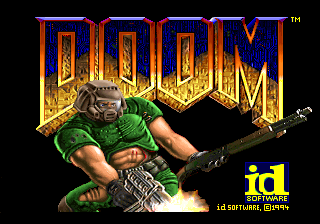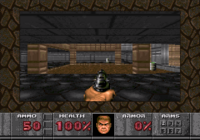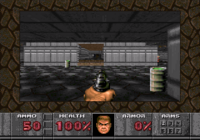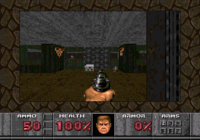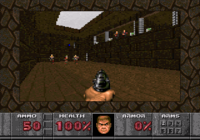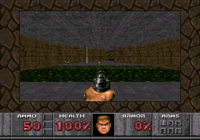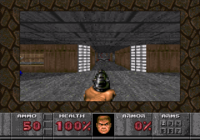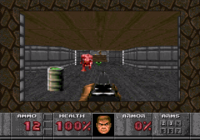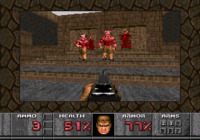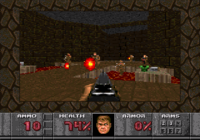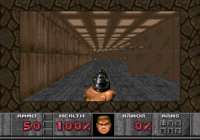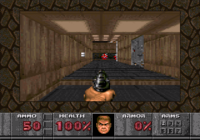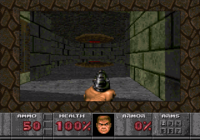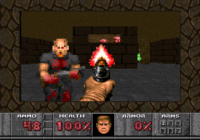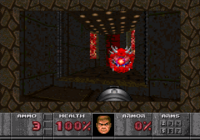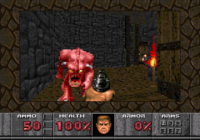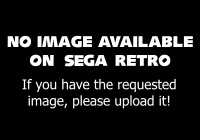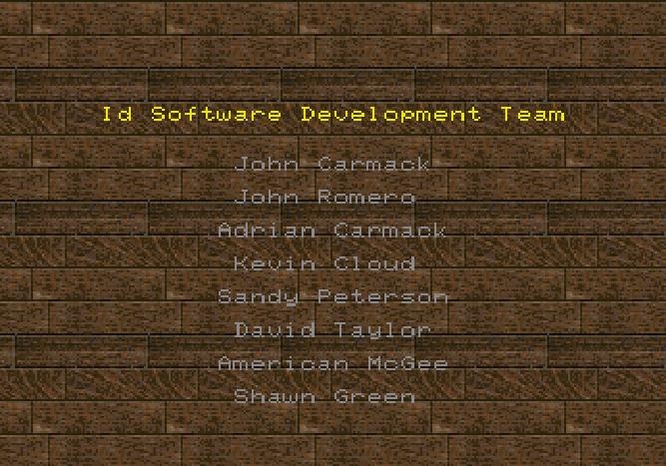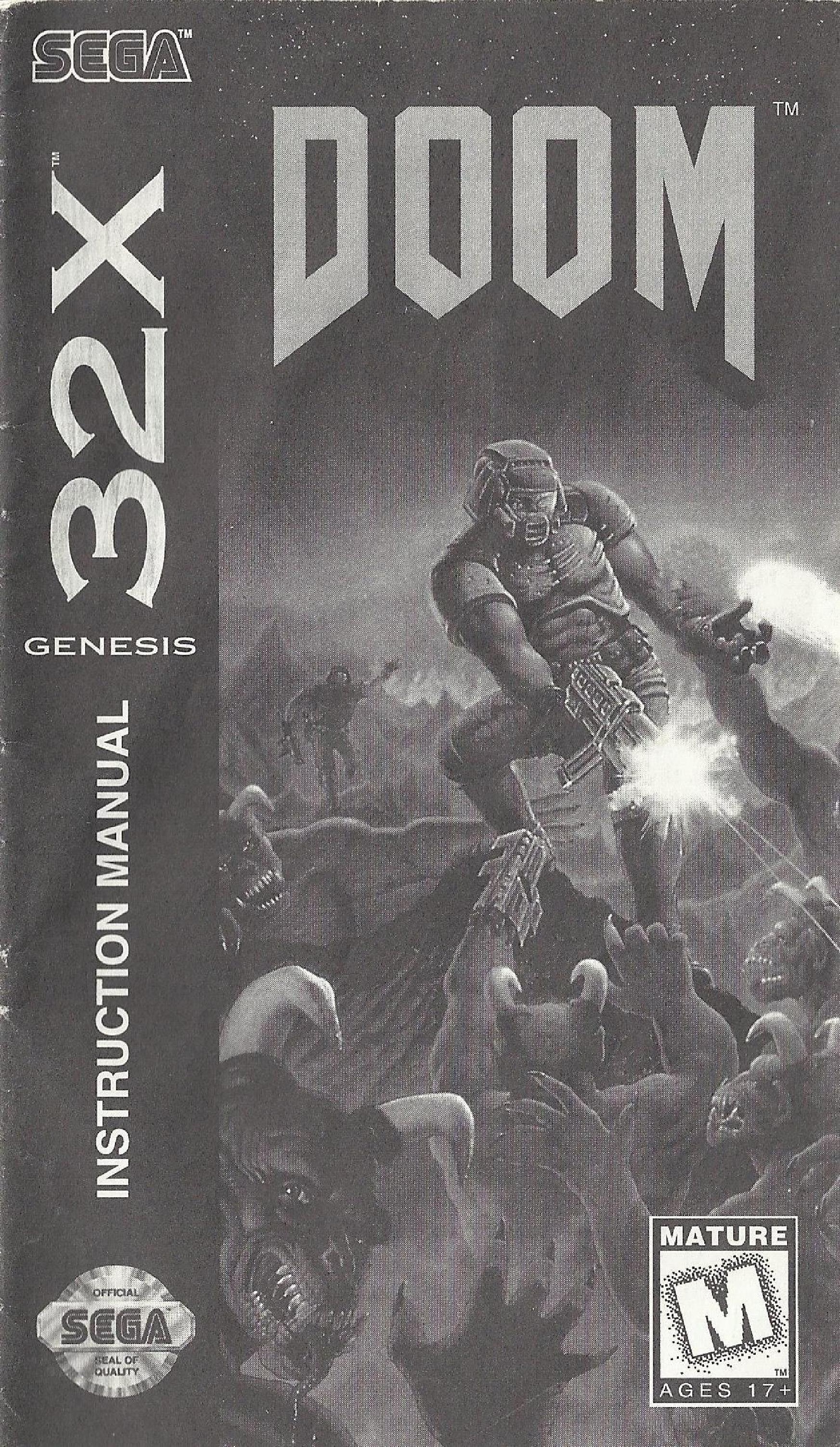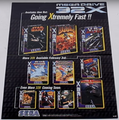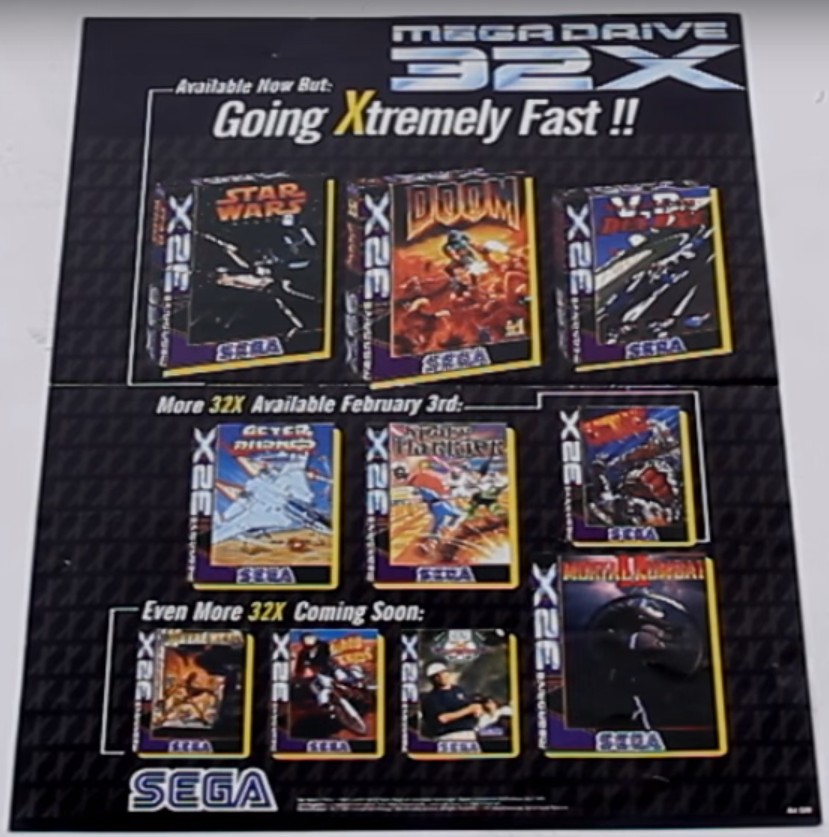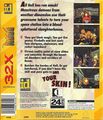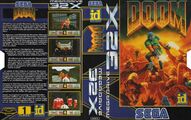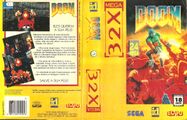Doom (32X)
From Sega Retro
| Doom | |||||||||||||||||||||||||||||||||||||||||||||
|---|---|---|---|---|---|---|---|---|---|---|---|---|---|---|---|---|---|---|---|---|---|---|---|---|---|---|---|---|---|---|---|---|---|---|---|---|---|---|---|---|---|---|---|---|---|
| System(s): Sega 32X | |||||||||||||||||||||||||||||||||||||||||||||
| Publisher: Sega Enterprises, Ltd. (JP, EU), Sega of America (US) | |||||||||||||||||||||||||||||||||||||||||||||
| Developer: Sega of America | |||||||||||||||||||||||||||||||||||||||||||||
| Supporting companies: id Software | |||||||||||||||||||||||||||||||||||||||||||||
| Distributor: Ecofilmes (PT), Tec Toy (BR) | |||||||||||||||||||||||||||||||||||||||||||||
| Original system(s): IBM PC | |||||||||||||||||||||||||||||||||||||||||||||
| Developer(s) of original games: id Software | |||||||||||||||||||||||||||||||||||||||||||||
| Sound driver: GEMS | |||||||||||||||||||||||||||||||||||||||||||||
| Peripherals supported: Six Button Control Pad | |||||||||||||||||||||||||||||||||||||||||||||
| Genre: Action[1], Shooting[2] | |||||||||||||||||||||||||||||||||||||||||||||
| Number of players: 1 | |||||||||||||||||||||||||||||||||||||||||||||
| |||||||||||||||||||||||||||||||||||||||||||||
| |||||||||||||||||||||||||||||||||||||||||||||
- For the Sega Saturn game, see Doom (Saturn).
Doom (ドゥーム) is a first person shooter developed by id Software and released on December 10, 1993 for DOS-based IBM PC compatibles. It was later ported to numerous platforms, including the Sega 32X (as a launch title). It is widely considered to be one of the games that pioneered and popularized the first person shooter genre, and retains a large, dedicated fanbase to this day.
The player assumes the role of a nameless space marine and through use of a varied set of weaponry, must fight his way through moonbases on Mars and the depths of Hell itself.
Contents
Gameplay
The game is played through the eyes of the main character. The player navigates through the level and collects weapons, ammunition, powerups, and other miscellaneous items. Certain doors are locked via a red, blue, or yellow keycard which are hidden throughout the level. Eventually the player finds the exit and progresses to the next level. Every so often a boss is encountered, where the level ends upon defeating the boss.
Levels are often made more varied by use of gimmicks and traps such as elevators, poisonous pits, monster closets, and secret rooms.
Controls
General
D-Pad - Moves character. Holding ![]() while using the D-Pad moves character at running speed. Holding
while using the D-Pad moves character at running speed. Holding ![]() while using D-Pad makes character strafe instead.
while using D-Pad makes character strafe instead.
![]() - Fire.
- Fire.
![]() - Use (Open/close door; Activate switch).
- Use (Open/close door; Activate switch).
When in Automap:
D-Pad - Moves character.
![]() - Zoom in.
- Zoom in.
![]() - Zoom out.
- Zoom out.
![]() - Activates/deactivates grid.
- Activates/deactivates grid.
START - Pauses with options menu; Resumes.
You can swap ![]() ,
, ![]() and
and ![]() button functions around in options. It will also affect automap controls.
button functions around in options. It will also affect automap controls.
3-Button Mode
Pressing START while holding ![]() - Scroll through available weapons.
- Scroll through available weapons.
Pressing START while holding ![]() - View Automap.
- View Automap.
When in Automap:
Pressing START while holding ![]() - Toggle Follow mode on/off.
- Toggle Follow mode on/off.
Pressing START while holding ![]() - Hide Automap.
- Hide Automap.
The US manual has wrong information about Automap controls for 3-button controllers, further contributing to rushed feel of this title.
6-Button Mode
![]() - Scroll up through available weapons.
- Scroll up through available weapons.
![]() - Scroll down through available weapons.
- Scroll down through available weapons.
![]() - View Automap.
- View Automap.
When in Automap:
![]() - Toogle Follow mode on/off.
- Toogle Follow mode on/off.
![]() - Scale up or down instantly.
- Scale up or down instantly.
![]() - Hide Automap.
- Hide Automap.
Pressing any button aside from D-Pad while holding MODE will bring up a corresponding weapon. Examples: MODE + START brings up fists/chainsaw (pressing again switches between them if player has the Berserk Pack), MODE +![]() brings up pistol, etc.
brings up pistol, etc.
Using Six Button Control Pad is highly recommended. Cheats also require use of buttons that aren't available on Three Button Control Pad.
Weapons
| Fist | |
|---|---|
| When completely out of bullets, the game will automatically change the current weapon to the fist. | |
| Chainsaw | |
| Once the chainsaw has been obtained, it is impossible to re-select your fists as you can in other versions of Doom. | |
| Pistol | |
| Shotgun | |
| Chaingun | |
| Rocket Launcher | |
| Plasma Rifle | |
Despite being highlighted in the US manual[8], the most powerful weapon on Doom, the BFG 9000, is not accessible during normal play due to the third episode being removed.
Items
Ammo
| Clip | |
|---|---|
| Ammo Box | |
| Shells | |
| Box of Shells | |
| Rocket | |
| Rocket Case | |
| Cell | |
| Bulk Cell | |
Health and armour
| Health Potion | |
|---|---|
| Stimpak | |
| Medikit | |
| Soul Sphere | |
| Spiritual Armor | |
| Security Armor | |
| Combat Armor | |
Miscellaneous
| Radiation Suit | |
|---|---|
| Berserk Pak | |
| Backpacks | |
| Computer Map | |
| Invulnerability | |
The "blur artifact" (or "partial invisibility") and light-amplification visor, which exist in other ports of Doom, are not available on the 32X through normal play.
Enemies
| Former Human | |
|---|---|
| Former Human Sergeant | |
| Imp | |
| Demon | |
| Lost Soul | |
| Cacodemon | |
| Baron of Hell | |
Missing from this list, but which are present in the original IBM PC version of Doom, is the Spectre enemy (essentially a semi-transparent Demon) and the two strongest enemies in the game, the Cyberdemon and Spiderdemon (the latter due to episode 3 being cut from this version).
Contrary to what the US manual claims[9], enemies will not fight each other in this version of Doom (although they can still damage each other). Unlike the PC version, enemies only have front-facing sprites (which runs counter to the screenshots on the back of the North American box), however still have "waiting" code, meaning it is possible to sneak up on them. This leads to situations where an enemy appears to be looking at the player, but does not react to his or her movements from certain angles.
Levels
The 32X version doesn't name its maps, simply labelling them with numbers. The names below come from the original IBM PC version of the game.
On the 32X, the first two episodes are played roughly in order, save for E1M9 which is moved to the end of the game, and E2M8 which is missing entirely. No maps from episode 3 appear in this version.
Levels 16 and 17 can only be accessed if the player beats the game, starting from level 1, with no cheats enabled. The US manual again erroneously claims that there is a "wrap-around" feature, where as an example, it suggests starting at level 8 will see the player progress to level 15 before then tackling levels 1-7[10]. Instead, the player will receive the "bad ending" after level 15, and be greeted with a fake DOS prompt.
| 1 (Hangar; E1M1) | |
|---|---|
| 2 (Nuclear Plant; E1M2) | |
| 3 (Toxin Refinery; E1M3) | |
| 4 (Command Control; E1M4) | |
| 5 (Phobos Lab; E1M5) | |
| 6 (Central Processing; E1M6) | |
| 7 (Computer Station; E1M7) | |
| 8 (Phobos Anomaly; E1M8) | |
| 9 (Deimos Anomaly; E2M1) | |
| 10 (Containment Area; E2M2) | |
| 11 (Refinery; E2M3) | |
| 12 (Deimos Lab; E2M4) | |
| 13 (Command Center; E2M5) | |
| 14 (Halls of the Damned; E2M6) | |
| 15 (Spawning Vats; E2M7) | |
| 16 (Fortress of Mystery; E2M9) | |
| 17 (Military Base; E1M9) | |
History
Development
Doom arrived on a 24Mb (3MB) ROM cartridge, albeit at some point of time it was reported that it will be upgraded from 24Mb to 32Mb (4MB), making it the largest 32X game in development at the time[11]. Most likely it didn't make it to 32Mb due to the third episode levels being cut out to save development time in order to become Sega 32X launch title. If we take a look at the size of known prototypes of this game then we will see that prototypes between September 6 and September 21 were larger than 3MB, as well as October 2 build.
Builds were leaked onto the internet in February 2008 on Hidden-Palace site.
Versions
The 32X port of Doom derives from the Atari Jaguar version, which adjusts level layouts in areas to ease with rendering, as well as potential hardware constraints, and/or aesthetics on a TV screen as opposed to a computer monitor. Despite this, the game managed to debut on the 32X before the Jaguar version was finalised. Leaked prototypes suggest that 32X Doom was originally more in-line with the PC version, the switching of levels occurring as an mid-development optimisation.
32X Doom does not run at full screen - while the system is technically capable of rendering a full 320x224 Doom image, a border is applied to mitigate performance concerns in some areas. Due to storage space limitations on a cartridge many decorative objects and textures are missing and monsters have only front-facing sprites, albeit it's still possible to sneak up on enemies in rare cases as their behavior wasn't changed to take it into account. Monsters infighting was removed. Demons wake up on sound only if player is directly present in their radius.
Interestingly, the 32X version updates its Automap in real-time when it's activated, while on PC the changes will show up only if you hide and view the Automap again.
The levels set is shared with Atari Jaguar version, both being in development at the same time. Most likely 32X levels were being ported from Atari Jaguar in-progress builds. Atari Jaguar family levels set contains heavily simplified layout of levels from PC original, some maps being completely different, using less textures and objects as well. Due to 32X version being rushed it ended up being released before Atari Jaguar version thus the levels set is unfinished in comparison. It's missing the third episode and there are occasional glitches: Hall of Mirror effect in Level 10, for example. You can't finish certain levels 100% as some monsters were misplaced outside of rooms.
The music was also noticeably changed, the developers deciding to remake the soundtrack with GEMS and keep it on the Mega Drive side only rather than use the 32X's PWM — having to make launch date didn't help the situation either. It is considered to house one of worst interpretations of Doom's music, with even the Super NES surpassing it in terms of quality.
The game now features a level select menu, allowing the player to select any level within the game; however, by using the level select, the game only presents the user with a DOS prompt at the end, instead of giving the true ending away. Curiously US manual mistakenly says that in such case the game will wrap back to the first level so player can complete the remaining ones.
On the 32X, Doom usually runs at around 15-20FPS - a long way from the PC version's 35FPS, but higher than several other versions, such as the 3DO, Super NES and even Sega Saturn. Sega suggested that the 32X Doom performed just as well as an Intel 486 PC clocked at 50MHz, though was far less expensive[12].
Interestingly enough, there are few builds of Doom 32X that were made after the final version. The files were named as "Doom RR", quite possible new revision was planned for the game. These builds contain no differences from final Doom 32X release much to public knowledge.
Production credits
- : John Carmack, John Romero, Adrian Carmack, Kevin Cloud, Sandy Peterson, David Taylor, American McGee, Shawn Green
- Programming: Jonathan E. Flamm, Banjo Bob Hardy, Toshiyasu Morita, Marty Franz, Rex Sabio, Unni Pillai
- Music: Brian Coburn
- Art: Jenny Martin
- Producer: Jesse K. Taylor
- Software Testing: Mike Baldwin, Joel Breton, Chris Lucich, Matt Underwood, Fernando Valderrama, Kim Rogers, Ben Cureton, Lloyd Kinoshita, Alfred Dutton, Sam Sallba, Stan Weaver, Mike Mansourian, Carey Camacho, Aaron Hommes, Jeff Loney
- Special Thanks To: Jay Wilbur, Dave Albert, JBM III
- Biz Guy: Jay Wilbur
- Biz Assistant: Donna Jackson
- Software Engineers: John Carmack, John Romero, Dave Taylor, Shawn Green
- Artists: Adrian Carmack, Kevin Cloud
- Designers: Sandy Peterson, American McGee
- Composer: Robert Prince
- Doom Logo: Don Punchatz
- Producer: Jesse Taylor
- Assistant Producers: Vincent Nason, Greg Becksted
- Product Manager: Tim Dunley
- Product Specialist: Nemer Velasquez
- Programming: Jonathan Flamm, Robert Hardy, Unni Pillai, Toshi Morita
- Art: Jenny Martin, Susan Greene
- Music: Brian Coburn
- Game Lead: Michael Baldwin
- Assistant Game Leads: Joel Breton, Christopher Lucich, Matt Underwood
- Testers: Fernando Valderrama, Aaron Loichinger, Kim Rogers, Ben Cureton, Lloyd Kinoshita, Aaron Hommes
- Manual: Carol Ann Hanshaw, Jay Wilbur
- Special Thanks: Haven Dubrul, David Albert, Robert W. Lindsey, Doria Sanchez
Magazine articles
- Main article: Doom (32X)/Magazine articles.
Promotional material
also published in:
- Power Unlimited (NL) #20: "Jaargang 3, April 1995" (1995-03-22)[15]
also published in:
- Strana Igr (RU) #2: "Mart 1996" (1996-xx-xx)[16]
Television advertisements
Artwork
Physical scans
| 88 | |
|---|---|
| Based on 37 reviews | |
| 32X, BR |
|---|
Technical information
- Main article: Doom (32X)/Technical information.
References
NEC Retro has more information related to Doom
|
- ↑ File:Doom 32X JP Box Front.jpg
- ↑ 2.0 2.1 http://sega.jp/fb/segahard/32x/soft.html (Wayback Machine: 2013-06-19 13:31)
- ↑ GamePro, "December 1994" (US; 1994-xx-xx), page 64
- ↑ Computer Trade Weekly, "" (UK; 1994-11-14), page 5
- ↑ Computer & Video Games, "January 1995" (UK; 1994-12-15), page 73
- ↑ Sega Magazine, "August 1994" (UK; 1994-07-15), page 70
- ↑ Sega Megazone, "December 1994" (AU; 1994-1x-xx), page 20
- ↑ File:Doom 32x us manual.pdf, page 12
- ↑ File:Doom 32x us manual.pdf, page 21
- ↑ File:Doom 32x us manual.pdf, page 5
- ↑ Sega Magazine, "November 1994" (UK; 1994-10-15), page 9
- ↑ Mean Machines Sega, "December 1994" (UK; 1994-10-28), page 26
- ↑ File:Doom 32X credits.pdf
- ↑ File:Doom 32x us manual.pdf, page 22
- ↑ Power Unlimited, "Jaargang 3, April 1995" (NL; 1995-03-22), page 76
- ↑ Strana Igr, "Mart 1996" (RU; 1996-xx-xx), page 87
- ↑ GamesMaster, "January 1995" (UK; 1994-12-22), page 63
- ↑ Beep! MegaDrive, "January 1995" (JP; 1994-12-08), page 26
- ↑ Computer & Video Games, "January 1995" (UK; 1994-12-15), page 72
- ↑ Computer + Video Giochi, "Gennaio 1995" (IT; 199x-xx-xx), page 76
- ↑ Electronic Games (1992-1995), "February 1995" (US; 1995-0x-xx), page 74
- ↑ Electronic Gaming Monthly, "January 1995" (US; 199x-xx-xx), page 40
- ↑ Famitsu, "1994-12-09" (JP; 1994-11-25), page 39
- ↑ FLUX, "Issue #4" (US; 1995-xx-xx), page 82
- ↑ GameFan, "Volume 2, Issue 12: December 1994" (US; 1994-xx-xx), page 27
- ↑ GamePro, "February 1995" (US; 199x-xx-xx), page 60
- ↑ Gamer, "Ianouários 1995" (GR; 1995-xx-xx), page 1
- ↑ Gamers, "Januar 1995" (DE; 1995-01-08), page 35
- ↑ Games World: The Magazine, "February 1995" (UK; 1994-12-xx), page 15
- ↑ Game Informer, "December 1994" (US; 1994-1x-xx), page 12
- ↑ Hobby Consolas, "Diciembre 1994" (ES; 1994-xx-xx), page 78
- ↑ Joypad, "Décembre 1994" (FR; 1994-1x-xx), page 90
- ↑ MAN!AC, "01/95" (DE; 1994-12-07), page 48
- ↑ Mega, "December 1994" (UK; 1994-11-30), page 20
- ↑ Mega Force, "Megadrive 32X elle est là!" (FR; 1994-12-02), page 22
- ↑ Mega Fun, "01/95" (DE; 1994-12-21), page 31
- ↑ Micro Kid's Multimédia, "Février 1995" (FR; 1995-0x-xx), page 60
- ↑ Micromanía (segunda época), "Diciembre 1994" (ES; 1994-xx-xx), page 22
- ↑ Mean Machines Sega, "January 1995" (UK; 1994-11-30), page 76
- ↑ Player One, "Décembre 1994" (FR; 1994-1x-xx), page 64
- ↑ Play Time, "2/95" (DE; 1995-01-04), page 101
- ↑ Power Up!, "Saturday, December 17, 1994" (UK; 1994-12-17), page 1
- ↑ Power Unlimited, "Jaargang 3, Februari 1995" (NL; 1995-01-25), page 40
- ↑ Saturn Fan, "1995 February" (JP; 1995-01-07), page 34
- ↑ Sega Magazine, "December 1994" (UK; 1994-11-15), page 70
- ↑ Sega News, "Leden 1997" (CZ; 1997-xx-xx), page 34
- ↑ Sega Power, "February 1995" (UK; 1994-12-15), page 50
- ↑ Sega Pro, "January 1995" (UK; 1994-12-01), page 40
- ↑ Sega Pro, "April 1996" (UK; 1996-02-28), page 24
- ↑ Sega Force, "2/95" (SE; 1995-04-19), page 8
- ↑ Sega Saturn Magazine, "September 1995" (JP; 1995-08-08), page 84
- ↑ Todo Sega, "Diciembre 1994" (ES; 1994-1x-xx), page 28
- ↑ Ultimate Future Games, "January 1995" (UK; 1994-12-01), page 97
- ↑ VideoGames, "December 1994" (US; 1994-1x-xx), page 72
| Doom (32X) | |
|---|---|
|
Main page | Comparisons | Maps | Hidden content | Development | Magazine articles | Video coverage | Reception | Region coding | Technical information | |
- Six Button Control Pad-compatible games
- 1 player games
- JP 32X games
- All JP games
- US 32X games
- All US games
- EU 32X games
- All EU games
- PT 32X games
- All PT games
- UK 32X games
- All UK games
- AU 32X games
- All AU games
- BR 32X games
- All BR games
- AS 32X games
- All AS games
- 32X games
- 1994 32X games
- All 1994 games
- 32X shoot-'em-up games
- All shoot-'em-up games
- Old content rating field
- All games
- Old-style rating (gamesmaster)
- Update ratings template
- 1 old ratings
- Doom (32X)
